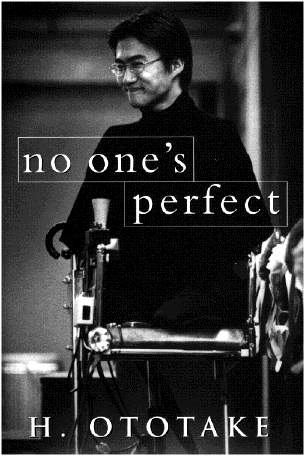One's
Perfect
Hirotada Ototake
(Kodansha)
 Hirotada Ototake was born in 1976 with tetra-amelia, a cogenital condition that left him with almost no arms or legs. His parents determined that, as much as possible, he would live a "normal" life. This means that he was given no special treatment either at home or at school, and ended up participating in schooling and sports. He played basketball, pulled himself around on his behind for the 50-meter dash, and had his friends take him up Mount Kobo.
Hirotada Ototake was born in 1976 with tetra-amelia, a cogenital condition that left him with almost no arms or legs. His parents determined that, as much as possible, he would live a "normal" life. This means that he was given no special treatment either at home or at school, and ended up participating in schooling and sports. He played basketball, pulled himself around on his behind for the 50-meter dash, and had his friends take him up Mount Kobo.Oto is obviously a smart cookie, and his willingness to take on anything to get him through school and into the prestigious Wasada University is inspiring. His coming-of-age story, No One's Perfect has become an instant best-seller in Japan. According to the publisher, it has sold over 4,500,000 copies --- the second largest selling book in that country in fifty years. This is even more amazing, they tell us, in light of the fact that in Japan there is a powerful prejudice against fumanzoku --- lit. "not all there."
Oto has become a celebrity in Japan and many other parts of the world, and it's easy to see why. He is daring, alive, charming and --- apparently --- never sad. He undertakes to work and to play with minimal help, always with a smile, always upbeat. In fact, he reminds us of that old song,
Where never is heard
A discouraging word
And the skies are not cloudy all day.
There is no doubt that he has done a yeoman job in breaking the barriers of prejudice in Japan. Still, I am going to suggest, spoilsport me, that many of us in the world of disability are going to have trouble with his unfailingly bright view of the world. I can't help thinking that Oto, like the rest of us, has periods of self-doubt, of anguish. There have to be times when he cannot accomplish something he holds dear --- perhaps some intimate physical act that he chooses not to tell us about.
He tells us, for example, that girls "weren't beating down his door," then says,
No matter how brave a face we may put on it, the hard fact is that people with disabilities do have a handicap in love.
Now, we think, at last, he will tell us something the possible sadness of being different --- most especially for one at that particularly tough age, being puberty, when those tiny differences get magnified out of proportion. But...no:
I think the important thing is not to turn your disability into an excuse. True, when your heart's just been broken, it may be the first thing you think of... but was that the real reason it didn't work out?
The key here is the change of case. Before, it was "I thought..." and "I was on top of the world..." It was "I think" and "I began to have confidence..." Now all of a sudden it's your disability, when your heart's been broken. In psychology this is known as displacement. At what might be a moment of revelation of his humanity becomes, instead, a preachment:
I don't suppose a disability is actually an asset in too many people's eyes, but don't let that stop you. In the end, it all comes down to what you, as a person, have to offer.
Instead of an honest revelation, what we have here is a manual for stiff- God knows, I don't want to spit in the soup --- I certainly wouldn't wish misery on anyone in his --- or my --- situation, but the lack of agony in this book leaves me decidedly on edge. When at one point he is being wheeled down the street and he passes some kids shouting "What's that?" and "Gross!" --- are we to suppose that Oto has no reaction at all? Is such possible? Are we to believe in all his twenty-five years he has never had even one dark night of the soul --- wondering, "Why me?"
The Japanese, as the rest of the world, want to be convinced that one who has to crawl up stairs and scramble up into chairs is always merry, never blue. Thus his popularity. But --- with or without arms and legs --- if Oto is completely happy, then he is either one in a million, or he is a saint.